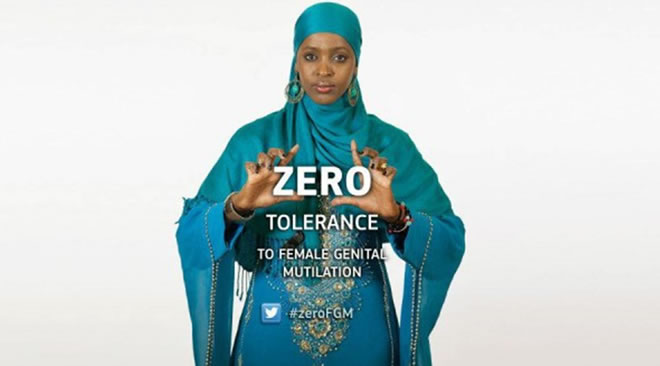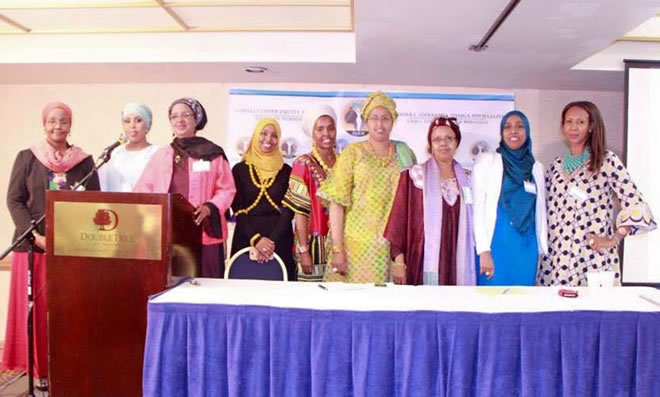Pioneering group of Somali women are returning to their birth country to create, despite many obstacles, a more egalitarian society.
by Hassan Santur
Wednesday, July 1, 2015

Anti FGM poster featuring activist Ifrah Ahmed
“The fight starts at home,” Ifrah Ahmed tells me over a crackly cell phone reception. “And I felt that I can be the voice,” she continues with the conviction of a woman who has found her calling in life. An accidental calling, it turns out.
In 2008 when Ifrah Ahmed applied for asylum in Ireland, she underwent a mandatory medical examination. She recalls the doctor asking her how she injured her “privates” as she puts it. Ifrah Ahmed says that was the first time she told a stranger about what was done to her as a little girl. “I am a survivor of female genital mutilation…When I went to the hospital I met other women seeking asylum. We were about 18 African girls from different countries. I asked the other girls if they had [the] same experience as me. And the answer was yes. I remember one of the girls who told me that she was circumcised with broken glass.”
Ifrah Ahmed looks back at her experience with her fellow African asylum seekers as a turning point; the embryonic stage of her activism. “I say to them, do we have to suffer with silence. They say they did not want to talk about it...I felt that I can be the voice.I have to speak out against it.” And a voice she has become. Since she started speaking out against female genital mutilation, Ifrah Ahmed has traveled across Europe lobbying governments to do more to combat FGM. She has since worked with European Parliament, UNICEF and UNHCR. But she says she felt her voice was most needed in Somalia where she could do her small part to contribute to her fledgling country. In August 2014, Ifrah made the move back home.
 - Zainab Hassan’s talk at TedX Mogadishu in 2014. She leads The National Library restoration initiative of the Heritage Institute for Policy Studies in Mogadishu, Somalia.
- Zainab Hassan’s talk at TedX Mogadishu in 2014. She leads The National Library restoration initiative of the Heritage Institute for Policy Studies in Mogadishu, Somalia.
Contributing to Somalia also inspired Zainab Hassan. Thousands of miles away from Ireland in Minnesota, Zainab had an epiphany; that whatever talents and skills she possessed were desperately needed in Somalia.
“After participating in a National Dialogue on Justice and Rule of Law Conference that was held in Mogadishu in 2013, I was impressed with the development efforts and rebuilding of the country, especially Mogadishu that was taking place, and decided to make contributions toward rebuilding the shattered country and society…The Heritage Institute for Policy Studies contacted me and asked if I would be willing to lead the revival of The National Library initiative which I graciously accepted.”
Writer, human rights and social justice activist, Zainab Hassan spent many years living in the United States where she was awarded a Masters of Public Affairs by the Humphrey Institute of Public Affairs at the University of Minnesota. Alongside her work at The National Library in Mogadishu, Zainab Hassan has become an outspoken advocate for a meaningful inclusion of Somali women in the country’s nascent democracy. She sees the lack of full inclusion of women in the country’s political process as a major obstacle to the building of a more equitable society.
“Somali women’s quest for political participation has been a longstanding struggle,” Zainab says. Compared to neighbouring countries, Somali women’s involvement in national politics lags way behind. Zainab says this is a critical issue because having a seat at the national table where important decision are made, decisions that directly impact women’s lives, is not just about diversity or equal opportunity. It’s absolutely vital to the development of Somalia as it emerges out of two decades of armed conflict.

Somali Gender Equity Movement (SGEM) conference in Minneapolis, MN
A growing body of research shows that when women are empowered as political leaders, a coun¬try’s standard of living goes up. Education, infrastructure and health also improve.
Zainab Hassan says the time has come for Somali women’s voices to be heard. “Somali woman will not regain their rights unless a collective and concerted struggle and efforts based on shared consciousness of oppression is waged.”
In early June 2015, at a glitzy event in Minneapolis, Minnesota, Zainab Hassan along with several other Somali women launched the Somali Gender Equity Movement (SGEM) which she describes as “a global movement of Somali women who have united to advocate for gender equity in Somalia.”
Zainab points out that the most pressing issue SGEM is working on is to promote political equity in time for the 2016 election. I ask Zainab if Somalia is ready for the kind of gender-based political power sharing she envisions?
Her answer is simple: if Rwanda can do it, why not Somalia. She argues that if Somalia is ever going to change, it must emulate Rwanda, a country whose parliament is currently ranked number one in the world for women, who hold the majority of seats at 64 percent, including the speaker of parliament as well as 35% of cabinet positions. These are staggering numbers women in many Western countries could only dream of.
Both Zainab Hassan and Ifrah Ahmed see the value of working with the current, male dominated political system. They advocate not so much for a revolution but an evolution of Somali society so that issues that uniquely affect women such as lack of political participation, female genital mutilation, gender-based violence and child marriage become as much a national discussion as security and the economy.
Ifrah Ahmed, who has worked with the Ministry of Gender and Human Rights on various initiatives such Somalia’s landmark Sexual Offences Bill, says her work in the country depends on the help of enlightened leaders, male and female.
“As an activist, I cannot make a difference without having the voice of the government…when I go to courts or hospitals [or] I go on the Somali National Television to speak out against FGM, gender violence and even child marriage, I can use the power of the government.”
As for Zainab Hassan, she says SGEM will advocate for the “Federal Parliament of Somali to include the legislation and policies governing the development of political parties and the organization of elections to require 40% female representation at all levels. SGEM will propose that the President put aside certain seats for women through the appointment process. [We] will develop Gender mainstreaming framework that should be implemented at all bodies of government institutions from top to bottom.”
Ifrah Ahmed has already succeeded at getting the attention of Somali leadership at the highest level. In May 2015, when she won the Women4Africa
Humanitarian of the Year Award in London, she received a congratulatory phone call from President Hassan Sheikh Mohamoud. Such recognition, Ifrah says, encourages her to keep going and continue being a voice for the countless Somali women and girls who have been rendered voiceless and powerless for far too long.
“Somali society can never compensate the suffering, injustices, and discrimination committed against Somali women,” Zainab Hassan says. She demands that their efforts and good performance be acknowledged and special efforts be made to ensure equal opportunity. “Public policies must be enacted to solve social problems.” The time has come, she says to listen to the voices of the over 9,000 (and growing) Somali women who have joined the efforts of Somali Gender Equity Movement to change the status quo
Changing the status quo for Somali women will not be easy. All great social and political movements for equality take time, visionary leaders and countless supporters.
Somalia’s struggle for independence from colonial rule took decades and the collective efforts of revolutionary women such as Hawo Osman Tako. Somalia has a long history of women fighting for women’s rights. In 1976, the Somali poet Xaawa Jibriil wrote a poem called “Women Are a Force” in which she chastises President Siad Barre and the Secretary General for only paying lip-service to gender equality. In the last line of her poem, she poses the question: “are you not tormented by the injustice they suffer?
The great struggle for women’s rights in Somalia will require not weapons or stones but vision and ideas. Ideas that might seem foreign, even antithetical to Somali culture but with time will hopefully become as Somali as hilib and caano.
On July 1, Somalia celebrates its 55th anniversary of independence. There will be colourful festivities across the country. Fireworks and patriotic songs will fill the air. But unseen and unheard amidst all the jubilant celebration, is the plight of millions of Somali women and girls.
Girls whose brothers are sent to school while they toil away in the kitchen. Girls whose bodies are mutilated for the sake of tradition. And women who are violated with impunity in camps for internally displaced people.
Zainab Hassan and Ifrah Ahmed are among a cadre of Somali women educated abroad and now back in Somalia to speak on their behalf. Women like Dr. Hawa Abdi, Asha Haji Elmi, Hawa Adan Mohamed, Ilwad Elman, Edna Adan Ismail and many other trailblazers, who have harnessed their talents and ideas, not only to rebuild Somalia but more importantly, to remake it for the 21st century.
Hassan Santur
[email protected]